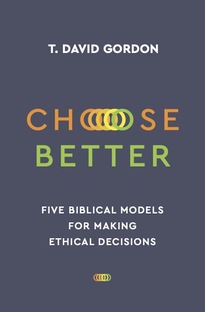
T. David Gordon
Reviewed by: Jonathan Landry Cruse
Choose Better: Five Biblical Models for Making Ethical Decisions, by T. David Gordon. P&R, 2024. Paperback, 144 pages, $16.99. Reviewed by OP pastor Jonathan Landry Cruse.
T. David Gordon has done the church a great service with his recent book, Choose Better: Five Biblical Models for Making Ethical Decisions. The little book is the author’s attempt to help us think “Christianly about decision-making” (123)—something that many do not give much thought to at all. The book is an accessible, comprehensive, and pastoral introduction to the subject of ethics.
The book is written in the clear and compelling style that we have come to love from Dr. Gordon. On this subject, nothing else could be more helpful. “Ethics” seems to be locked away in an academic and philosophical ivory tower, yet it is the most practical subject imaginable! It is, after all, “the study of how to live and how to live well” (ix). How crucial it is that we have a resource that can help us understand it and think through it. What Gordon does for us in this book is synthesize the scholarly jargon and present us a palatable and useful work on an important and overlooked subject.
This does not mean that the book is trite or simplistic. On the contrary, one of its strengths is comprehensiveness. Gordon presents five models for making ethical decisions, which serve as an exhaustive examination of the Bible’s teaching on ethics. That each model is biblical is key; in other words, he is not pitting one model against another, but showing us the wide array of resources that the Scriptures afford to us when it comes to thinking through difficult decisions: “My point throughout this work is that the five models derived from the Holy Scriptures are complementary . . . and that, therefore, we gain the fullest ethical perspective when we permit each of the models to bring its own particular cluster of questions to bear on the matter at hand” (xiv).
The first of the five models that Gordon presents is the imitation model, which “emphasizes more what one is than what one does” (2). The good life, therefore, consists in our being like God on a creaturely scale, pursuing a full recovery of what it means to be the imago Dei. The law model, in contrast, focuses more on the doing. Gordon presents the clear imperatives of Scripture (like the Ten Commandments) as representative of this approach to ethics. A question asked in this model, for example, is, “Has God commanded anything relevant to that matter at hand?” (31). The wisdom model contemplates the outcome of decisions, acknowledging that even “within the realm of that which is lawful, not everything is equally helpful” (54). A helpful comment made under this model is that “it permits us to commend, in areas where we have no authority to command” (73)—a lot of division in the church would be alleviated by grasping this distinction. The fourth model, the communion model, enjoins prayer and spiritual disciplines, and the fifth model, the warfare model, acknowledges that the decisions we make are often the battlefield upon which sin wages war against our regenerate souls.
Even in this brief survey, it should be clear that Gordon’s interests are primarily pastoral. He wants us to do that which is pleasing to God. He calls us to know the Scriptures in order to live well. But he also cautions that knowing more does not guarantee a better life: “Thinking rightly about life does not mean that one will live rightly” (xv). That’s why living well isn’t the goal of the Christian life; the goal is knowing Christ, “who became to us wisdom from God” (1 Cor. 1:30). Gordon concludes with a comment that might sound absurd coming from an ethicist but makes perfect sense coming from a pastor:
As a minister of the gospel, I would remind my readership that the “work of God” is to believe in the One whom he sent (John 6:29). I would rather that all my readers believe in Christ and live badly than not believe in Christ and live well. (123)Because of this sort of tone that undergirds the entirety of the book, the comprehensive survey of the Scriptures, and the compelling way the material is presented, I would highly commend (not command!) Choose Better to you.
February 01, 2026
January 25, 2026
January 18, 2026
January 11, 2026
Texts that Transform: Church and Ministry
January 04, 2026
December 28, 2025
December 21, 2025
© 2026 The Orthodox Presbyterian Church